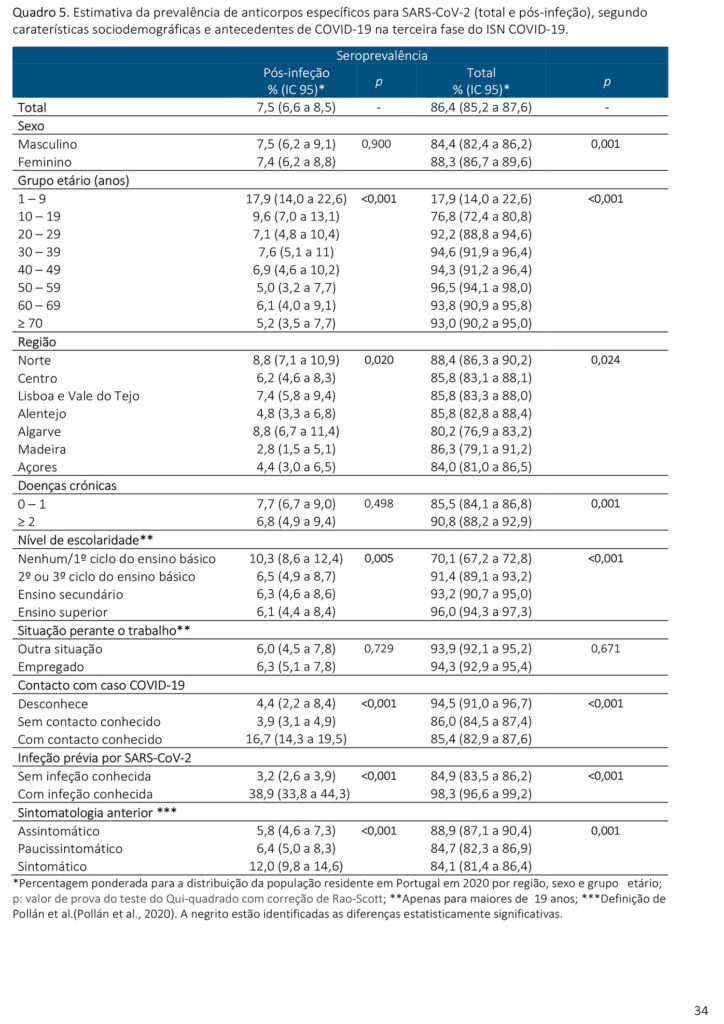The Algarve is the region in which the prevalence of specific antibodies against SARS-CoV-2 in the resident population, aged over 1 year, is the lowest in the whole country, reaching only 80,2%, according to data from the 3rd phase of the National Serological Survey COVID-19 (ISN COVID-19), promoted by the National Institute of Health Doctor Ricardo Jorge (INSA).
Among the population residing in Portugal, the total seroprevalence was 86,4%, 7,5% being attributable to a previous infection, according to the same study.
Regarding the characteristics of the population, the highest total seroprevalence in the population between 50 and 59 years of age (96,5%), in individuals with higher education (96,0%) and in individuals with two or more diseases stands out. chronic (90,8%).
The age groups under 20 years old were those with the lowest total seroprevalence (17,9% between 1-9 years and 76,8% between 10-19 years old).
years old).
With regard to post-infection seroprevalence, the results of the 3rd phase ISN COVID-19 indicate globally lower values than those obtained in the 2nd phase of the ISN COVID19 (7,5% vs 13,5%), which probably , is related to the decay of specific antibodies to SARS-CoV-2 over time post-infection.
This pattern was observed in most age groups and health regions, with the exception of the age group between 1-9 years and in the Algarve and Azores regions.
The titers of specific immunoglobulin G against the spike protein of SARS-CoV2 (anti-S IgG) were higher in people with three doses of vaccine and in those who were vaccinated and had a SARS-CoV-2 infection, being the lowest values estimated for the group of people with a single dose of vaccine and without infection.
IgG (anti-S) and neutralizing antibody titers were higher in the group of people who reported having been vaccinated with mRNA vaccines.
The INSA also reports a decrease in the IgG (anti-S) titer with the time since taking the second dose of the vaccine and with the age of the vaccinated and the strong positive correlation between the IgG (anti-S) and the titer of neutralizing antibodies.
“The results obtained are consistent with the current epidemiological situation, vaccine coverage and with the data obtained in the vaccine effectiveness studies”, emphasizes that Institute.
Developed and coordinated by the departments of Epidemiology and Infectious Diseases at INSA, in partnership with the National Association of Clinical Laboratories, Portuguese Association of Clinical Analysts and 36 National Health Service Units, the third phase of ISN COVID-19 analyzed a sample of 4.545 people residing in Portugal, recruited between September 28 and November 19, 2021.
For all participants, the presence of specific IgG against the Nucleocapsid protein of SARS-CoV-2 (IgG anti-NP) was determined and IgG titration (anti-S) was performed. In a random sample, neutralizing antibody titers against SARS-CoV-2 were determined.
This study allowed the continuation of the second ISN COVID-19, carried out between February 1st and March 31st, 2021, and which estimated an overall seroprevalence of 15,5% of infection by the new coronavirus in the population residing in Portugal.
The report presenting the results of the third phase of the ISN COVID-19 can be consulted at http://repositorio.insa.pt/handle/10400.18/7828





















Comments